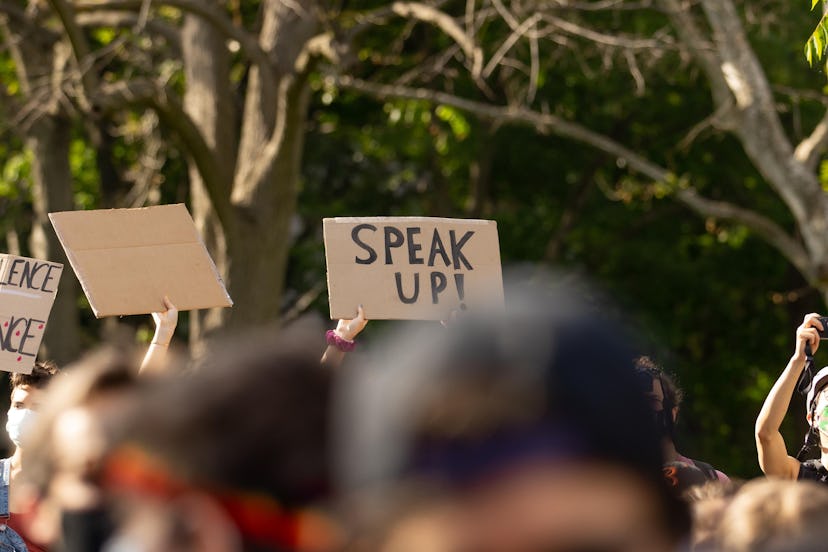Read & Resist: W’s Daily Briefing for June 4
From the DEA’s “covert surveillance” of protesters to the problem with anti-racist reading lists, here’s what to read up on today.

Back in the day, W started off the morning with a quick round-up of links to that day’s fashion- and culture-related news. Times have changed; in the week since a white police officer named Derek Chauvin killed an unarmed black man named George Floyd, protests have erupted across the country, which seems to be devolving more into a police state by the day. Now, more than ever, it’s important to stay up to date, which is why we’re reviving “Chic in Review” as the slightly more radical “Read & Resist.” Here are the stories, videos, and tweets we’re hoping you don’t miss this Thursday:
“We Need To Rethink Our ‘Pics or It Didn’t Happen’ Approach to Activism”
“Silence online now is interpreted as silence full stop—as if a donation is worth less if it’s not made public, as if you’re weak if you choose to contribute to causes quietly,” Yomi Adegoke writes in this British Vogue opinion piece. “The trauma of constantly reliving these injustices online—not to mention the mental anguish that it takes to conjure quotes for public consumption in the midst of a global pandemic that is killing us in disproportionate numbers—is irrelevant.”
“What Is an Anti-Racist Reading List For?”
Reading lists are everywhere—to the point that books on race relations, like White Fragility and The New Jim Crow—are selling out. But the consolidation of essays, memoirs, folklore, and poetry into a single genre, Lauren Michele Jackson writes in Vulture, “reinforces an already pernicious literary divide that books written by or about minorities are for educational purposes, racism and homophobia and stuff, wholly segregated from matters of form and grammar, lyric and scene.”
“His Name Is Justin Howell”
“He has a fractured skull. He has brain damage. Doctors anticipate that when he wakes up, he will have difficulty telling his left from his right,” Joshua Howell writes of his 20-year-old brother Justin—who was protesting when police shot him with a “less lethal” round of beanbag bullets—in this opinion piece for the Battalion.
“The DEA Has Been Given Permission To Investigate People Protesting George Floyd’s Death”
For this Buzzfeed News piece, reporters Jason Leopold and Anthony Cormier uncovered a two-page memorandum granting the Drug Enforcement Administration authority to “conduct covert surveillance” and intelligence on protesters.
“U.S. States Have Been Trying to Criminalize Protests for the Past Five Years”
“In the years prior to recent large-scale protests and the 2016 election victories of conservative state legislators, proposals chipping away at constitutionally-protected protest activity were few and far between,” Naveena Sadasivam writes in Rolling Stone, noting that only six bills were introduced between 2015 and 2016. “But in 2017—in the wake of nationwide protests over the police shootings of Philando Castile and Alton Sterling, protests against the Dakota Access pipeline, and marches responding to President Trump’s election—that number rose to 56.”
“Instagram Should Give Everyone Swipe Up”
“Swipe up has never been more useful for good. Links to places to donate money. Links to information about protests and marches. Links to anti-racism educational materials. Links to powerful articles by black writers,” Madison Malone Kircher writes in Vulture. And yet, Instagram only allows access to an overwhelmingly white portion of its users.
“Brands Have Nothing Real to Say About Racism”
For the Atlantic, Amanda Mull takes a look at how corporate America is purposely skirting saying anything of substance about the issues it’s pretending to address.
“The Videos That Rocked America. The Song That Knows Our Rage.”
“The most urgent filmmaking anybody’s doing in this country right now is by black people with camera phones,” Wesley Morris writes in the New York Times‘s Critic’s Notebook. “Art is not the intent. These videos are the stone truth.”
“How to Report Police Misconduct—and What to Expect If You Do”
“The system is not set up to make it easy for people to report misconduct and get satisfaction from it,” attorney Andrew Case tells Rachel Holliday Smith and Reuven Blau in this piece in The City. Last year, the Civilian Complaint Review Board received the highest number of complaints against the NYPD since 2013, but the city’s police commissioner, who has final say, has historically downgraded or ignored the group’s recommendations.
“The World’s Most Basic Guide to Contacting Your Reps”
For Vice, Hannah Smothers breaks down one of the easiest ways to take action against police brutality.